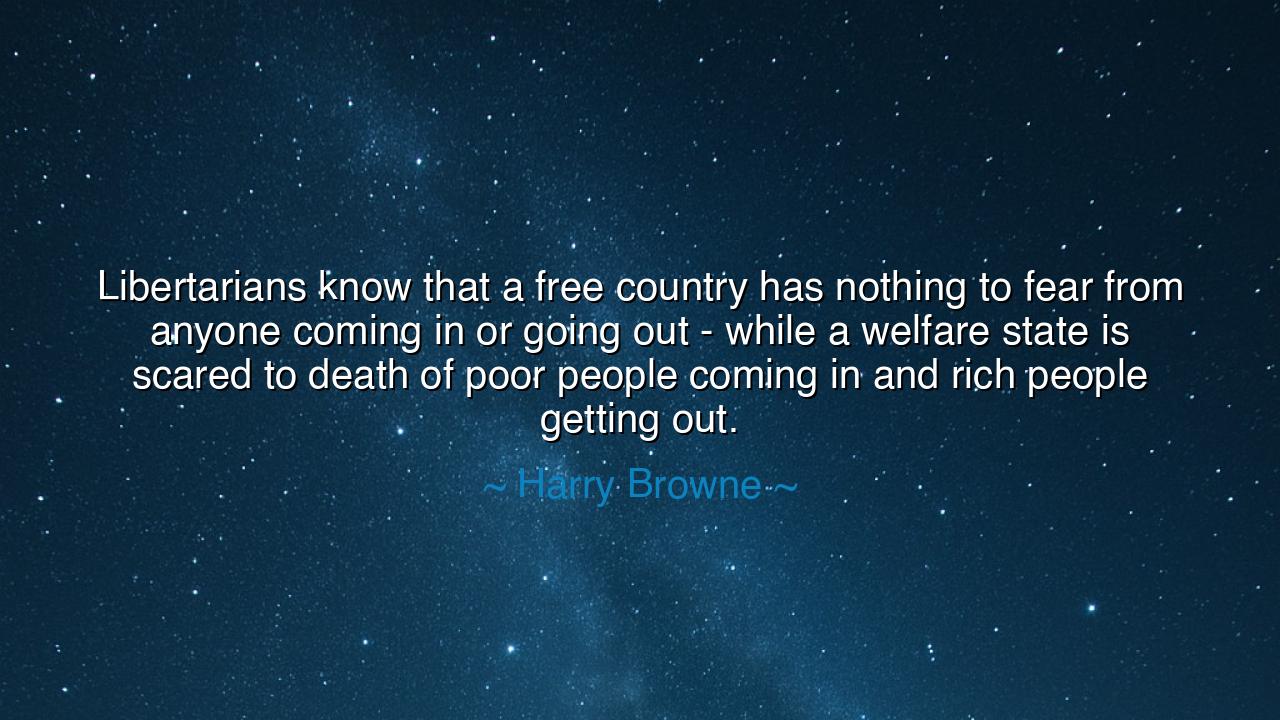
Libertarians know that a free country has nothing to fear from
Libertarians know that a free country has nothing to fear from anyone coming in or going out - while a welfare state is scared to death of poor people coming in and rich people getting out.






The thinker and political philosopher Harry Browne, a man who cherished the ideals of liberty and self-reliance, once declared: “Libertarians know that a free country has nothing to fear from anyone coming in or going out — while a welfare state is scared to death of poor people coming in and rich people getting out.” In these words burns the fire of freedom’s ancient wisdom — the eternal struggle between a people who govern themselves and a people who depend upon the hand of the state. Browne speaks not of borders alone, but of the very heart of what it means to be free: to live without fear, without coercion, and without the chains of dependency.
From the earliest days of civilization, freedom has been both mankind’s greatest blessing and its most perilous responsibility. In the age of the Greek city-states, Athens flourished because it trusted the strength and virtue of its citizens. Its people were not bound by the heavy hand of rulers or endless decrees, but by a shared belief that liberty and courage could sustain a nation. By contrast, when states become swollen with promises of comfort — when they trade freedom for protection — they begin to fear movement itself. The welfare state, as Browne describes, becomes like a fortress trembling at every open gate, terrified that the poor will drain its coffers and the wealthy will escape its grasp. Such a nation ceases to be bold; it becomes fearful, defending not freedom, but control.
When Browne says that a free country has nothing to fear, he speaks of confidence born from self-reliance and trust in individual strength. The free nation welcomes the traveler, the dreamer, the builder, for it knows that each person’s ambition enriches all. It does not fear the poor, for poverty is not permanent in a land where people are free to rise. It does not fear the rich departing, for wealth is not the hoard of the state but the fruit of creation. In such a land, borders are not walls of defense, but doorways of exchange — of knowledge, trade, and culture.
Contrast this with the trembling heart of the welfare state — a system built not upon trust, but upon fear. It must monitor, regulate, and restrain, lest its fragile balance collapse. It dreads the arrival of the needy, for they will demand sustenance from its already burdened treasury; it dreads the departure of the prosperous, for they carry with them the gold that feeds the system. Thus, it becomes a nation haunted by its own design — a place where generosity turns to anxiety, and protection becomes imprisonment. Browne’s warning is not against compassion, but against the illusion that compassion can be commanded by law rather than born from the heart of free men and women.
History, too, has offered its testimony. The mighty Roman Empire, in its early republic, thrived upon the virtues of independence and enterprise. Citizens built roads, trade flourished, and Rome welcomed new peoples into its fold. But as the centuries passed and the empire sought to buy loyalty with bread and spectacle, the spirit of freedom gave way to dependency. When the treasury ran dry and the wealthy fled its taxes, Rome grew weak, not from foreign invasion alone, but from the erosion of its inner strength. The welfare of its citizens became its downfall, for it replaced liberty with reliance, courage with complacency. Browne’s words echo like an ancient oracle: a nation that fears movement is already dying within.
The origin of this quote arises from Browne’s lifelong philosophy of libertarianism — a belief that true prosperity and peace emerge not from government control, but from personal responsibility and voluntary exchange. He saw freedom not as chaos, but as harmony — the natural balance that occurs when people are allowed to act according to conscience and merit. In his eyes, fear was the surest sign of tyranny — whether in the trembling hand of a ruler or the quiet resignation of a citizen too dependent to stand alone. His words remind us that liberty requires courage, and courage can never thrive where fear is the foundation of policy.
The lesson, then, is this: a free people must never fear freedom itself. Do not look to the state for safety, for safety is the slowest death of all. Instead, look to your own hands, your own mind, your own power to create, to build, to give. Let generosity flow not from compulsion, but from choice. Let wealth be a river, not a cage. And let the stranger who enters your land find not suspicion, but opportunity — for in every new soul lies the potential to enrich the world.
Thus, as Harry Browne reminds us, a nation’s greatness is not measured by how tightly it holds its citizens, but by how freely they may come and go, dream and do, give and grow. The free country stands unshaken, for its strength lies in its people, not its policies. The welfare state trembles, for its power depends upon control. Choose, then, the harder road — the road of freedom — and live not as one shielded by walls, but as one guided by purpose. For the day we cease to fear the open gate is the day we truly become free.






AAdministratorAdministrator
Welcome, honored guests. Please leave a comment, we will respond soon